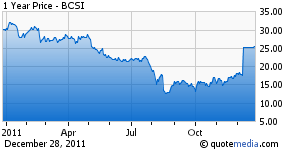 Judging by growing list of law firms “investigating” the proposed buyout of web security and wide-area network solution provider Blue Coat Systems, Inc. (BCSI), the company’s management team is guilty of the worst disloyalty to shareholders. On December 9, 2011, an investor group led by private equity firm Thomas Bravo, LLC announced its intention to acquire Blue Coat for $25.81 per share for a net purchase price of $1.3 billion. Since then at least one shareholder has filed suit, alleging misconduct by Blue Coat management and directors, and numerous other law firms have pledged similar suits. Apparently the 48% premium over the prevailing price the day before the deal was announced is considered inadequate.
Judging by growing list of law firms “investigating” the proposed buyout of web security and wide-area network solution provider Blue Coat Systems, Inc. (BCSI), the company’s management team is guilty of the worst disloyalty to shareholders. On December 9, 2011, an investor group led by private equity firm Thomas Bravo, LLC announced its intention to acquire Blue Coat for $25.81 per share for a net purchase price of $1.3 billion. Since then at least one shareholder has filed suit, alleging misconduct by Blue Coat management and directors, and numerous other law firms have pledged similar suits. Apparently the 48% premium over the prevailing price the day before the deal was announced is considered inadequate.
Several of the law firms that have attempted to jump on the class action bandwagon have cited analyst reports and price targets above the offer price. Most analysts would probably agree that it is educated guess-work at best. No matter how painstakingly detailed the analysis it is still subject to error.
To value Blue Coat myself, I decided to pull an oldie but goodie off the shelf - enterprise value. It is partially an accounting based valuation method, less dependent upon shaky predictions of future revenue and earnings. Enterprise value is calculated using the market value of the company’s common stock plus debt and minus cash. The result is considered valid as a take-over offer as it encompasses the effect of leverage and the acquirer’s control over liquid assets. The enterprise value of Blue Coat the day prior to the takeover announcement was $465.4 million ($748.2 million market cap plus $78.6 million debt minus $361.4 million cash). Thomas Bravo offered 2.8 times that value.
A strong argument can be made that Enterprise Value deals a company a bad hand since it makes no allowance for strategic